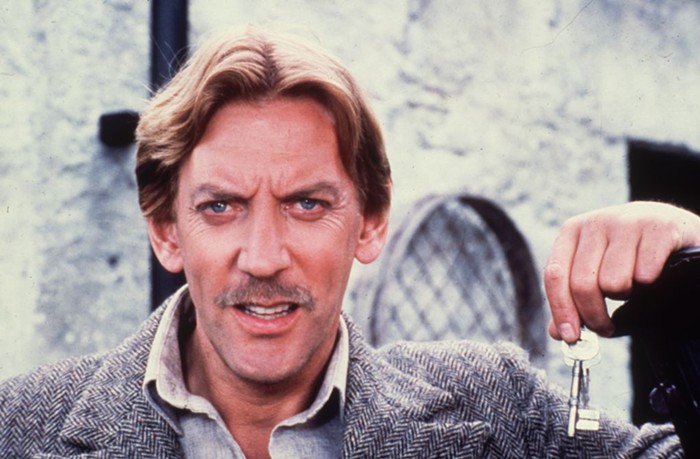
In acknowledgement of the 2020 Olympics, which would have kicked off in Tokyo last week, the Criterion Collection is streaming its monumental collection 100 Years of Olympic Films on their streaming platform, the Criterion Channel. The collection includes 53 films and covers 41 editions of the Olympic Games, from Stockholm in 1912 to London in 2012. Every weekday for two weeks, I'll highlight a different moment and film from the last century of Olympic films.
There isn't a sports documentary quite like Tony Maylam's White Rock, a fast and polished record of the 1976 Winter Olympics in Innsbruck (that's in Austria) which uniquely stars a Hollywood actor as a sort of Greek theatre-style narrator. The cool move is made cooler by the star cast as that narrator, the classic American tough guy James Coburn. The Nebraskan-born actor had a toothy grin and cowboy strut that made him a contemporary of the big dudes of the '50s through '70s, the Charles Bronsons and Clint Eastwoods.
Maylam cleverly plays on the original idea of a Greek monologuist by the way he stages Coburn, who sets up dramatic scenes with swagger. He monologues at the foot of a mountain as skiers fly past him. He monologues while on a bobsled. Think Green Eggs and Ham, except it's Coburn monologuing here, there, and everywhere. (I swear it's slick.) In the Western tradition of theater, monologues trace back to Greek theater, and the earliest Greek theater centers around a single speaker backed by a chorus. In White Rock, Coburn is our monologuist and the athletes are our chorus.
Here he is on that sled:

And here's one of his monologues, which comes near the end of the film.
He delivers the speech standing under the Olympic torch, staring out at the Austrian mountains. It's very Olympic. As he speaks, we see images of champions receiving gold medals. It's so close to being corny but Coburn somehow gets away with it:
In Delphi, when the Oracle was there,
the leaders of the world would stop the wars and stage the games,
because their ideal was epitomized in the glorification of the Olympic hero.
Here in Innsbruck and these Winter Olympics,
the men and women who projected themselves beyond their capabilities,
and alone before the eyes of the world obtained that moment of perfection,
can truly be called champions of the world.
These heroic achievements stand to inspire athletes of this generation,
and the next, and the next.
Each winter Olympics produces a higher standard of competition,
and the quality of performance grows, and with it
grows the individual.
Then he walks down the steps, away from the torch, and sexy synths start to play.

And the music... I've brought up soundtracks a lot in this series, from Freddie Mercury's Barcelona track to the shimmering soundtrack devoted to Alpine skier Jean-Claude Killy. I love to think about what makes a song or soundtrack Olympic. What feels right to underscore a gold medal? Something more than just a country's anthem.
In Mercury's booming and operatic Barcelona, we get a song that sounds like it's made of fireballs. In White Rock, we get an album from English prog rock icon Rick Wakeman that cuts like a blade on ice. The eight electronic tracks, titled things like "Ice Run" and "The Shoot," are meant to underscore certain winter sports. It's what I would listen to while driving up a snowy mountain. The album was so successful that Wakeman made a follow-up, White Rock II, in 1999.
Here's a trailer for White Rock, currently available on the Criterion Channel:
That trailer features an alternative soundtrack, but you should give Rick Wakeman's original soundtrack a listen:



















